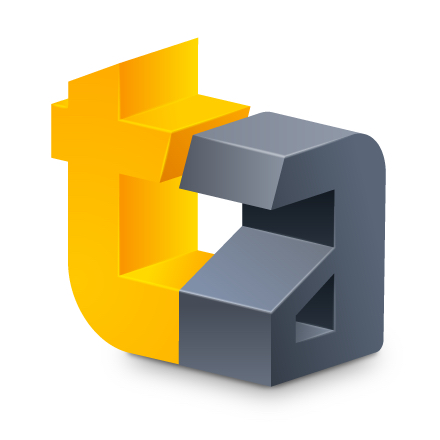 It’s time for the next installment in our monthly series of articles looking at the developers and publishers behind some of our favorite games. The aim here is for you readers to get a sense of the person, so the tone is more conversational than we usually use in interviews here at TouchArcade. It’s also not necessarily about the games themselves, either. Basically, we’ll kick off and see where the conversation takes us. This month, we’re speaking to Neil Rennison of Tin Man Games, the developer behind many of the finest gamebooks on the App Store.
It’s time for the next installment in our monthly series of articles looking at the developers and publishers behind some of our favorite games. The aim here is for you readers to get a sense of the person, so the tone is more conversational than we usually use in interviews here at TouchArcade. It’s also not necessarily about the games themselves, either. Basically, we’ll kick off and see where the conversation takes us. This month, we’re speaking to Neil Rennison of Tin Man Games, the developer behind many of the finest gamebooks on the App Store.
They’re probably most famous for their conversions of the Fighting Fantasy books such as House of Hell ($5.99) and The Forest of Doom ($5.99). They’ve also published their own original series called Gamebook Adventures, as well as a number of memorable one-offs like Ryan North’s To Be Or Not To Be ($6.99), Legacy of Dorn: Herald of Oblivion ($0.99), and Choices: And the Sun Went Out (Free).
For this transcript, Neil’s words will be bolded, while mine will be in regular text. And now, for the feature presentation.
Hi! Could you let everyone know who you are, in case they don’t know who you are? And of course, please include your favorite pizza toppings. That’s a vital part of the process.
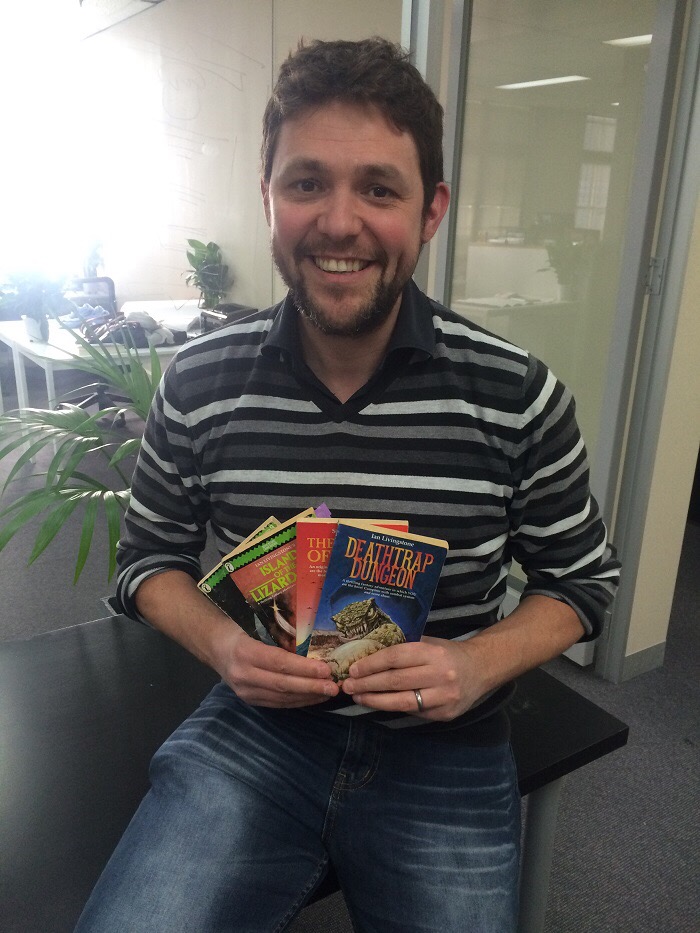 Okay. I’m Neil Rennison. I’m the founder of Tin Man Games, based here in Melbourne, Australia. Um, we’re best known for making digital gamebooks that have appeared on a bunch of platforms over the years, most notably on mobile platforms. My favorite pizza topping? It’s not a topping… well, I guess it is a topping. I really like curry pizzas. Anything that’s, like, a chicken tandoori pizza or a chicken tikka pizza, anything that’s got curry sauce on it and a bit of meat, I’m good for that.
Okay. I’m Neil Rennison. I’m the founder of Tin Man Games, based here in Melbourne, Australia. Um, we’re best known for making digital gamebooks that have appeared on a bunch of platforms over the years, most notably on mobile platforms. My favorite pizza topping? It’s not a topping… well, I guess it is a topping. I really like curry pizzas. Anything that’s, like, a chicken tandoori pizza or a chicken tikka pizza, anything that’s got curry sauce on it and a bit of meat, I’m good for that.
So you’re a curry fan?
Yes, it’s lovely.
We would get on very well.
Cool! (laughing) I do love a good Indian curry, that’s for sure.
I don’t know that Japanese curry is very representative of Indian curry, which I do enjoy, but Japanese curry? I could have that every night if I were allowed to. Fortunately, my wife doesn’t allow me to, so…
That’s probably a good thing!
I think so, yeah.
On Gamebooks and Why Tin Man Does Them
Alright, cool. So you are one of the big gamebook companies on the digital side of things, right?
Yeah, we’re one of two or three, I guess? Of the bigger ones?
I have to ask: how did you come to that, to gamebooks of all things?
Um, so basically what it was is that I was working in the game industry as a freelance artist for a number of years. Mainly building 3D environments for lots of games. I made a bit of money and wanted to start my own company, and so when I moved to Australia, because I’m actually from the UK, I thought it was a good time to do my own thing. I must admit the exchange rate was in my favor at the time, so I had a few more Australian dollars from bringing some money over and decided to start making a game. Around that time, the Apple Gold Rush had started, and TouchArcade was the Big Cheese, I seem to remember. I looked around at some of the games I played when I was a kid and thought, what would make a really good iPhone game?
Okay, go on.
I though, well, those Fighting Fantasy books that I read when I was 10 years old would be great to bring back. So I actually inquired about the Fighting Fantasy license, which was with Steve Jackson at the time, and unfortunately, it had already been granted to another company called Big Blue Bubble, in Canada. So I thought, well, I’m just going to do my own series instead then, and that’s how Gamebook Adventures was born, basically.
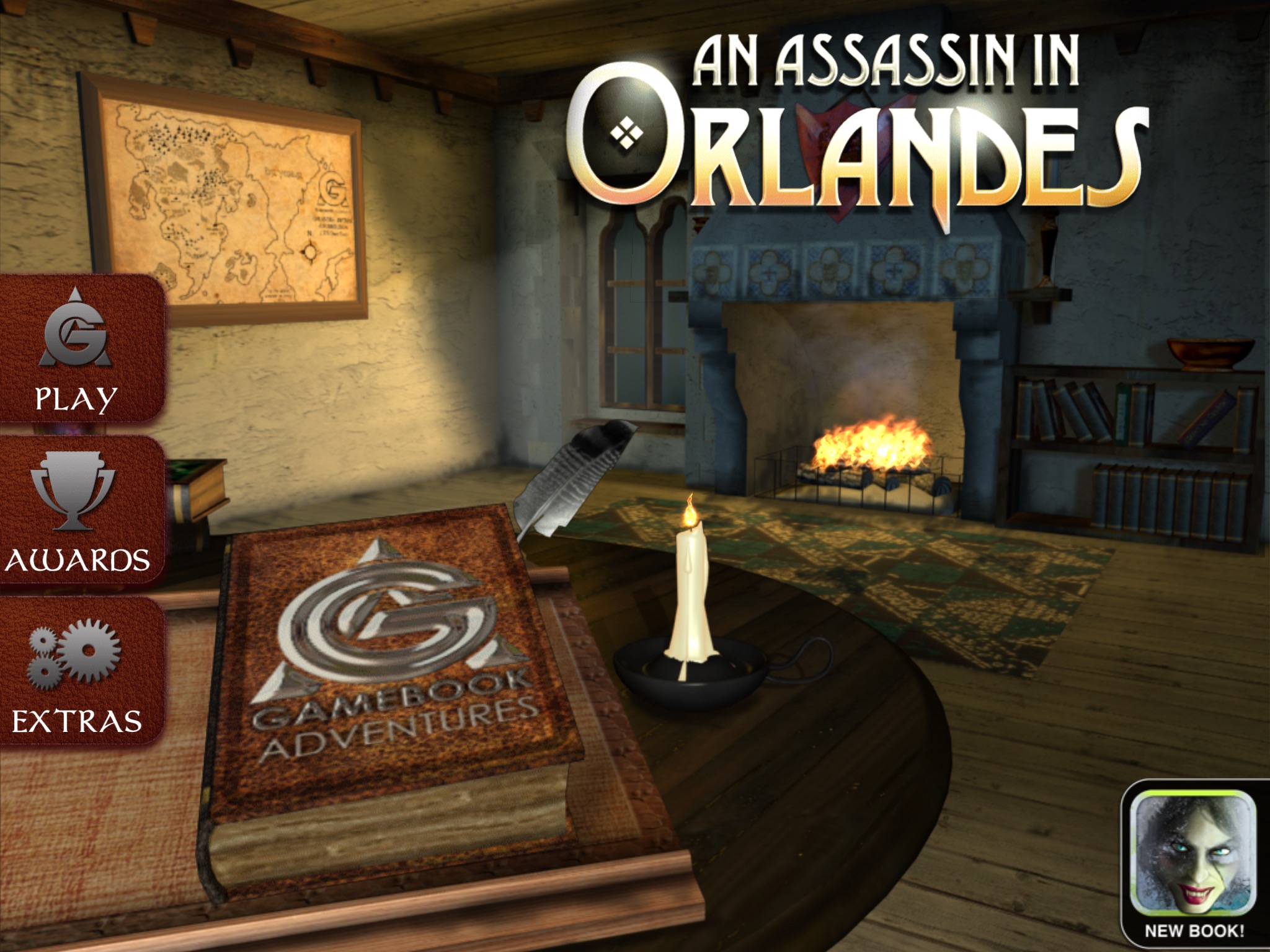
So you enjoyed gamebooks when you were a kid, did you have a particular favorite?
I didn’t, actually! I guess I always enjoyed the Fighting Fantasy books, and the first that I had was Deathtrap Dungeon. It’s a bit of a seminal work, really. My mom bought it for me, and I thought it was amazing. Then I went on to read the Grail Quest series, and I read a bit of Lone Wolf. I didn’t really get into Lone Wolf as much as other people did back then.
It seems like Lone Wolf was popular in some European countries, but I never really did see it in Canada, so I don’t know if it just didn’t make it big there or I just missed it, I don’t know.
Yeah, I think it just comes down to the publishers and how hard they push it, and I guess some of the European publishers, it was especially huge in Italy, pushed certain lines more than others. Fighting Fantasy was pushed very heavily in the UK by Penguin.
Yeah, in Canada as well. Penguin’s a very big force in Canada, too.
It’s funny, but when I go to the States and talk to people about what we do, nobody ever knows Fighting Fantasy. But they say, I know these books called Lone Wolf, so obviously the local publishers were pushing it in the States quite aggressively at some point.
It’s weird, but sometimes Canada takes after America, and sometimes it takes after the UK. Only when I talk to people from both countries do I ever understand what that separation is.
Hopefully you take all the good things from the UK! (laughing)
Well, you know, we’ve got the extra Us and the words that end in ‘re’, so that’s pretty good.
A good start!
I’m pretty happy with that, yeah. We get most of the comedy shows, and that’s also important, I think. Anyway, I only ever remember seeing Fighting Fantasy books when I was a kid, and I remember seeing Choose Your Own Adventure, which was huge. That was the hugest. Obviously not exactly gamebooks, but I think they’re kind of along the same lines.
I never got into Choose Your Own Adventure at all. I had a few friends that read them, as we had them in the school library. There was something about Fighting Fantasy that just captured my imagination more than anything else, I think. A lot of that is down to those iconic front covers, really.
They’re great!
Especially those first five, six, seven books in the series.
They’re great, they’ve got excellent art on them.
Yes, there’s something about that that just… it just caught my imagination like nothing else at the time. And you’ve got to remember back then that ZX Spectrum 48K, so my adventure game exploits were just, you know, text-based or very simple graphics. So, to see these wonderfully, beautifully-painted monsters on the front of this book, a book where I could choose the path through the book, create a character in the book, had a say in the adventure… you can’t underestimate how powerful that was back then. Because we had nothing like that. These days, everybody is spoiled for choices in the RPG world. It was an interesting time to be a kid, that’s for sure.
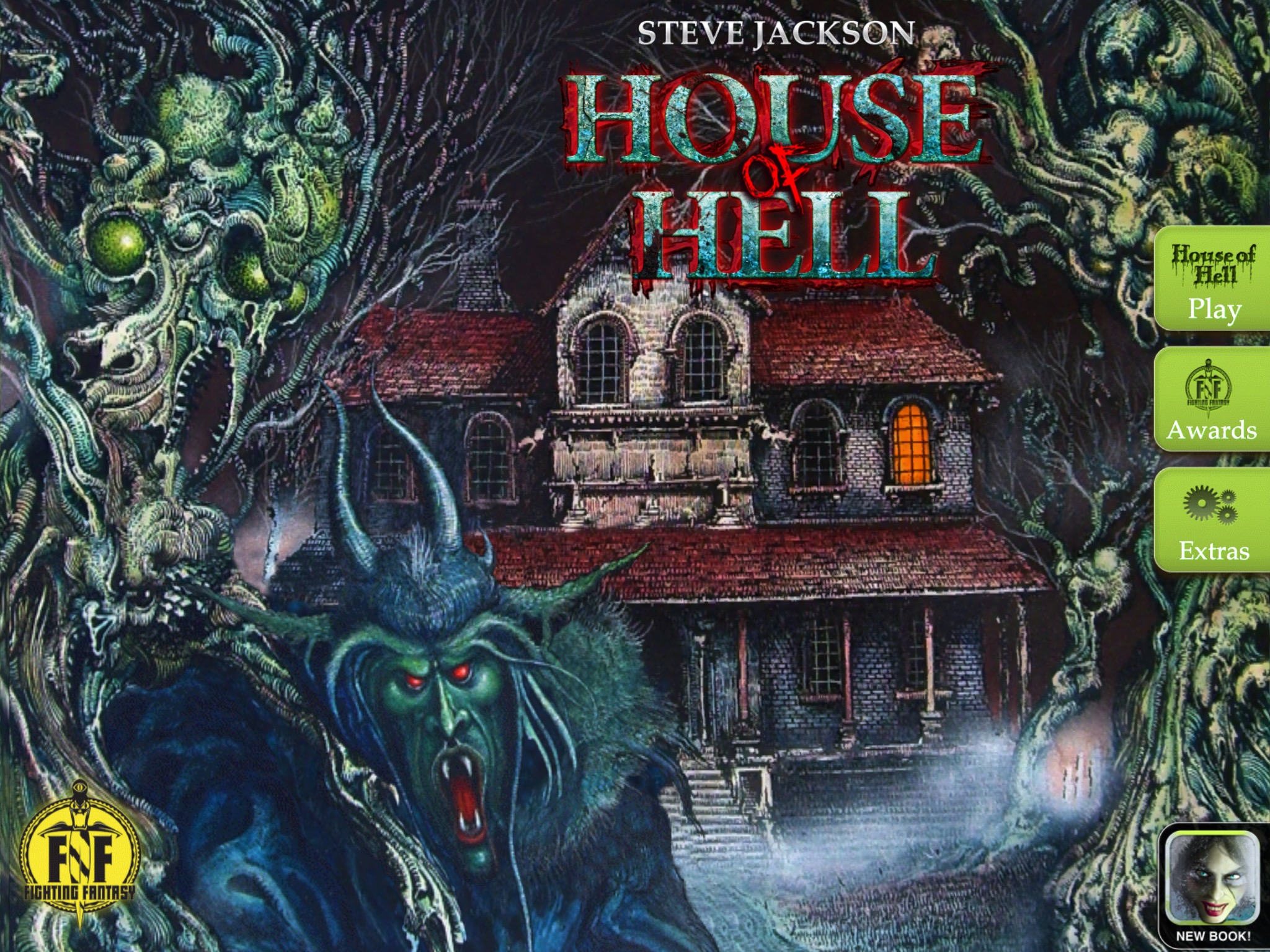
I’ve always maintained that gamebooks were the first handheld RPGs, such as they were. I’ve got a question, though. You were into the gamebooks, but were you into reading fantasy novels before that, too? Or was it just the game aspect that pulled you into that kind of setting?
I think it happened around the same time. I remember I was a big fan of horror. When I was eight or nine, I was a massive fan of horror. My parents got a VHS recorder, and we were one of the first families in the village where I grew up to have one. I used to record all the Hammer horror films at night, and then I remember reading Stephen King, or trying to, at that age, and struggling. Then Fighting Fantasy came along. I remember reading Tolkein as well, and Raymond E. Feist books like Magician, Silverthorn, that series. The Riftwar Saga, it was called. Then I got into Dungeons & Dragons, of course, in my teens, and that’s when everything went crazy.
There’s a strong horror element to a lot of the Fighting Fantasy books, too. I was always a little surprised that those were pushed towards kids, because I look back at them now, and… well, of course, things are different nowadays, kids get cleaner stuff than we did in our generation. But I look back at some of the Fighting Fantasy books now and I think, I’m surprised there were not more complaints from parents about some of these.
Yes, House of Hell actually is one of my favorites, so that probably says a lot.
That one’s really great. Did I do an RPG Reload on that one year?
Uh, you might have actually. Yeah, maybe. (I did, all the way back in File 010! -Smilin’ Shaun)
On Warlock of Firetop Mountain and Moving to a New Format
So I think it’s funny, you said your first one was Deathtrap Dungeon and, am I wrong here, has Tin Man not done Deathtrap Dungeon yet?
No, we haven’t, we haven’t. It’s been on the list for a long time, actually. But it was one of the apps that was created by Big Blue Bubble a number of years ago, so like Warlock of Firetop Mountain, it’s already been out as an iPhone app, once upon a time. We’ve tried to distance ourselves with a bit of time before visiting, revisiting those ones that Big Blue Bubble originally did. Which is why we recently released Warlock of Firetop Mountain on PC and Mac. It’s been a number of years since that book has been made into a game.
You really went for broke on that one. It looks amazing. I haven’t had a chance to play it yet because my computer is just a sad, sad thing, but it looks great. I can’t wait to play it on iOS eventually, I hope.
Yes, we’re actually doing the iOS port in a minute. We’re looking at the end of February of next year, fingers crossed.
Oh, cool.
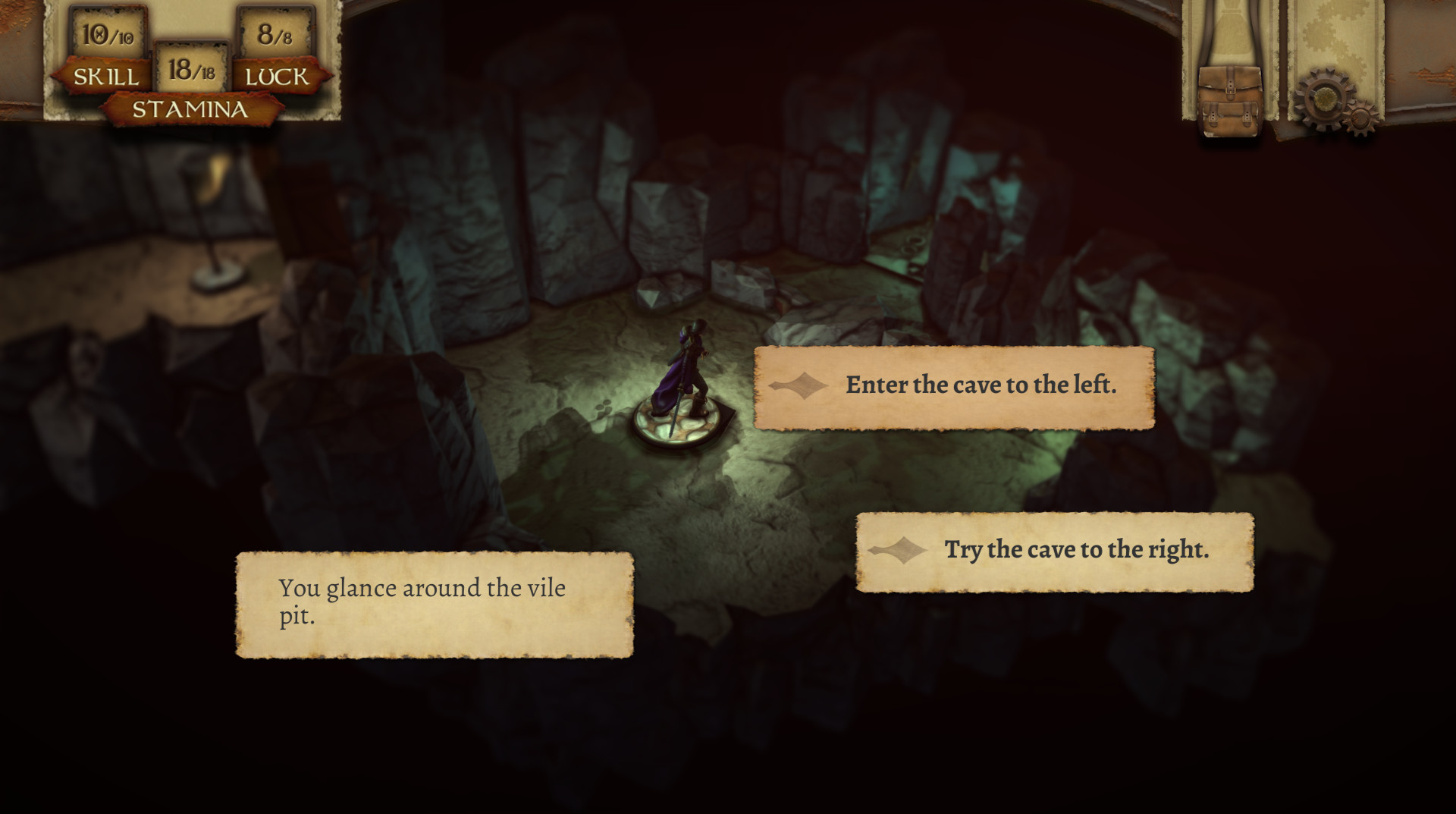
It’s been an interesting experience taking a PC game to try and squeeze it down into a tablet and phone-friendly game.
Yes, I imagine so. That was a Kickstarter project, right?
It was, yes.
How have you found that experience?
Ah, let’s think about this. (laughs) Which day have you caught me on? It was a really good thing to do, because Kickstarter is really great for raising funds to help make game projects come alive, especially when you have a project that is based on something that has nostalgia attached to it like Fighting Fantasy. It was great for that, because it meant we could raise some much-needed money. Not only did that help make the game better, but it also meant that the backers could feel like they were involved in something that they cared very deeply for. Some of the top-tier backers actually ended up with characters in the game. From that point of view, it’s really great.
Mmm-hmm.
The other side of the coin, of course, is that running a Kickstarter campaign is not cheap. In the end, by the time you’ve raised your money, taken out the Kickstarter fees, taken out the money that you needed to use to send out backer rewards, dealing with all of the support and the emails. You know, we’ve got, I can’t remember how many backers now, but around 1,200 backers, and all of those people need to be addressed, and supported, if there are problems. You don’t come out with much after that. But I think we did the right thing in raising money through Kickstarter because it was almost like free marketing in a way, early on in the process.
Okay. That’s kind of what I’ve heard from other developers who have worked with Kickstarter. I think there’s a perception among some that it’s just going to be free money, and then they get in and it’s like, this is bigger than I thought it would be. I guess it’s like any route that you’d have to go to get funding. There’s going to be some positives and negatives. There’s no such thing as a free lunch, as they say, right?
No, not all. Especially when some people paid you up to, like, $100 or something. That’s a lot of money for some people! So when they drop you an email asking if you can do this or that for them, you have to listen to them.
Because they invested in you, right?
Yeah.
So how has the response been to Warlock? Because that was something really different for Tin Man.
The response has been amazing, really. We’ve had some really good press, the user reviews are really strong, and it has a really positive rating on Steam. So yes, it’s been really great. I’ve gotten some positive emails from people that have just… I had an email from a guy the other day who said he was almost in tears.
Oh, wow!
Because I think he said he had suffered some problems when he was a child, and Fighting Fantasy was a really important escape for him. To play it as it is now and see all of the love and attention we’ve poured into it touched him quite a lot.
That’s great.
Yeah, it’s really cool. And yes, we’ve had a few negative responses, too. There’s a whole generation of gamers out there who don’t know what a gamebook is, they don’t understand the construction of them.
Yeah, that’s something I kind of wonder about, too. Because I love gamebooks, but I also grew up with them, and I really wonder if that younger demographic that never held a book like that in their hands, or never had an experience with that, if they can connect to this kind of experience?
It’s funny, but the word that comes up a lot among the younger reviewers we see, is that they call it a roguelike. (laughs)
It kind of is, isn’t it? (laughing)
They say it’s a roguelike but the dungeon doesn’t change. And I think, well, you’re correct, in a way. But that’s what it is. I’d never thought we’d be called a roguelike, but it comes up a lot. I guess they just don’t know what gamebooks are.
I feel like these days, ‘roguelike’ just means ‘you’re going to die a lot and you have to start over every time’. That seems to be all it means anymore.
Yes, which isn’t that bad at all.
So, is the plan then to do more gamebook treatments in the way that you’ve done Warlock?
Look, the hope is yes, but I can tell you right now that our humble apps that you see on the App Store, that are mainly text-based? The jump from that to what we’ve done with Warlock, financially, has been massive. You know, we’re talking about ten times the cost jump. So, um, the decision to make about doing any gamebook in this format, we can’t take that lightly, like we perhaps could with our older apps. We could make those a lot quicker and more cheaply. We could just pick and choose which games we wanted to do. But obviously, since costs have risen, we have to be very careful about what we do next. So the answer is yes, we’re looking into it, but we’re not 100% sure what we’re going to do.
Okay. Are you going to do anymore adaptations along the lines of your previous titles? Or is that format finished now?
Haa. So, we’re putting it to bed, a little bit. What we’re going to do is we’re going to release Warlock in the original form as well as our new fancy version. We’re going to see how that goes. There is talk of us creating something like a hub app. If there’s enough interest and people are really interested in it, we could see a lot of the Fighting Fantasy series come to that hub app.
Would that be set up similar to how Choices is done?
Pretty much, yeah. Probably not a subscription basis like Choices, but rather an IAP option to buy each book. The turnaround on that would be really quick for us, so we’d be able to get a lot of people’s old favorites out.
That would be good.
On Personal Hobbies and Kylie Minogue
So you mentioned you’re from the UK, you moved to Australia. How did that happen? You went all the way across the world, why?
Uh, something to do, really. Have to fill the hours of the day somehow. (laughs) I came out to Australia in 1987, as a lad. My auntie lives in Adelaide, and I came out with my mom. I just fell in love with the place. It was the time when Neighbours was on the telly, if anybody listening knows what Neighbours is. It’s an Australian soap, and it had Kylie Minogue in it at the time. And I fell in love with Kylie Minogue. Australia just had a wonderful mystique about it. I said to my aunt that I would live there one day. Then I met my now-wife, and on our first date we talked about how it would be great to live in Australia. That’s kind of how it all started, I guess.

Hunh, that’s interesting. So you just wanted to live there, so you picked up and went? That’s kind of cool. Did you have any culture shock?
Um, strangely, no. Australia is very different to the UK in lots of ways, but there are other things about the country that are very similar. There are a few things that grate or irk me, but you know, it’s great. I love this country, it’s brilliant.
Okay, so what’s the number one thing you miss from the UK that you can’t get in Australia easily?
Uh, number one thing… I kind of miss… well, Australia has great beer, don’t get me wrong, but I do miss a good pint of British ale, like a Windsor Ale or a Summer Ale. Um, you know, a beer festival where you’ve got all the ales to drink. I miss that. I also miss all the weird things, like Saturday afternoon football, the football results coming in on a Saturday afternoon. That whole, kind of, build-up to the weekend. It’s different over here.
Okay. So you’re probably a pretty busy guy, but when you are not working on games, what do you like to do in your free time, whenever you happen to have it?
Well, I’m also a dad to a six year old and a four year old, so they keep me busy.
Oh yeah!
I try to play video games to try and stay in touch with all of the stuff, but that’s not always as successful as I’d like it to be. (laughs) Games, especially console games, take so long to play these days. But I’ve started playing Xenoblade Chronicles, the old Wii game. I’m doing pretty well, I’m about 17 hours of the way through, which for me is amazing.
You’ve still got a ways to go! (laughing)
I bet I have! We live right by the beach, and I’m a water sports, a windsurfing kind of guy. I don’t do as much as I want to these days. I just like being by the beach, hanging out, traveling. Any chance for a decent road trip. Australia is amazing for road trips! Any road trip, I love that. But that’s hard for the kids as well.
Yeah, well, the ages they’re at, that’s tough. And…what do I want to say? Just from my own experience, you’re going to hit a sweet spot in a few years for road trips with them, and then once they become teenagers, it’s just going to become impossible. (laughs)
I can’t wait! (laughs)
Enjoy them now, sir, enjoy them now.
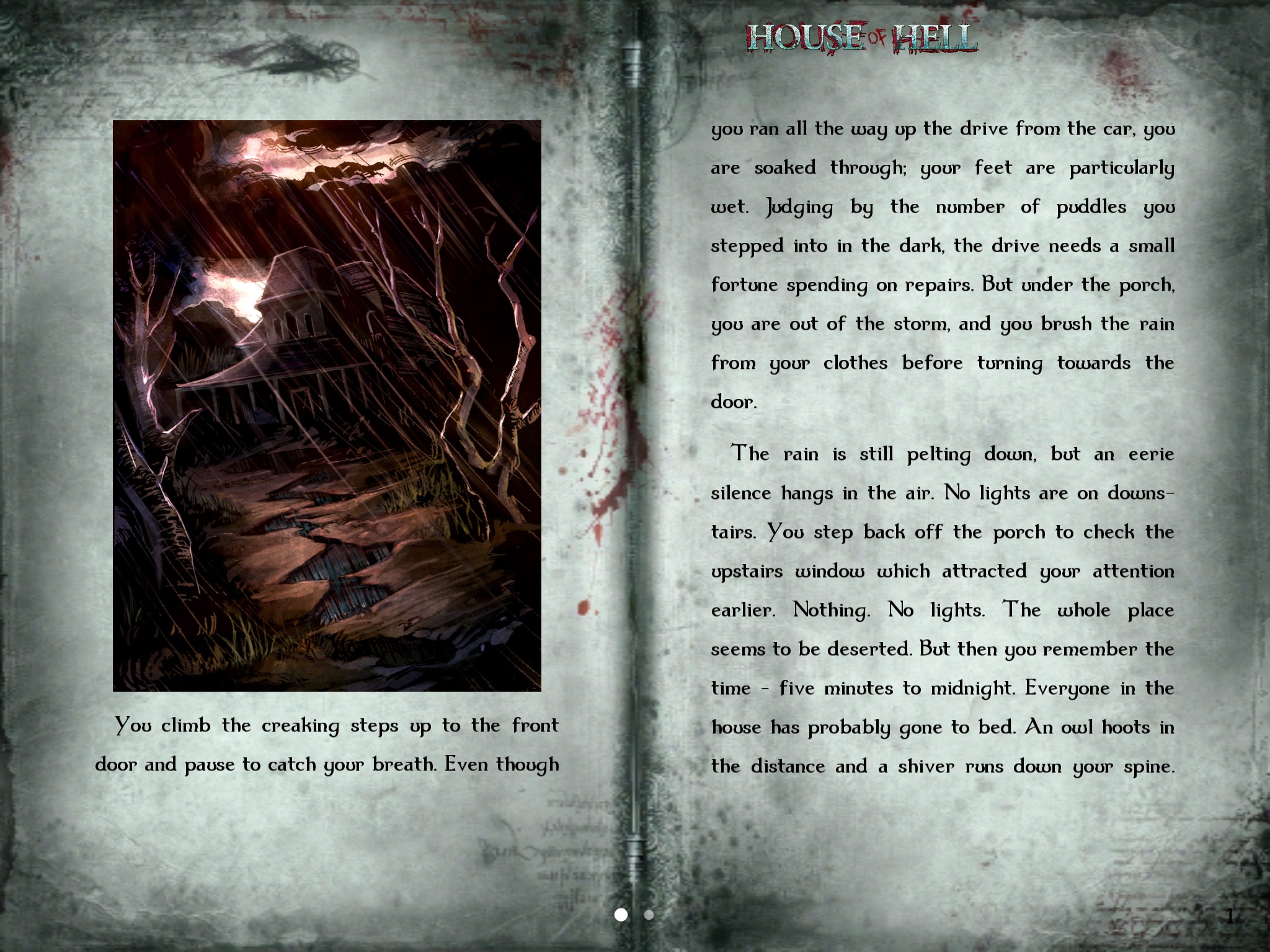
They need Fighting Fantasy books for their road trips, that’s what it is. That’s what got me through my road trips.
There you go! I’m sure that seems so low-tech to the kids now, though.
It’s the original portable game, really. No DS, no Nintendo nothing.
Yeah, it was that, and those little activity books you could get at the gas stations that had mazes. I don’t even know how I did some of those road trips when I was younger. Just compared to what kids have now, it’s like, whew, they can even watch movies in the car.
I know, they’re like, arguing in the back of the car over which movie to watch and I’m like, wow, you just have no idea. (laughing)
I remember flying out to cover events 17 or 18 years ago and you only had those screens every few rows that had one movie to watch on it. Now you ride on airplanes and you have your choice of, like, 300 different movies to watch.
Yeah, you almost get choice paralysis now.
It’s funny because I don’t think there’s any place I do more reading than when I’m flying. So you like the beach, you are clearly in the right country.
Yes. Well, the UK has some nice beaches, too. I used to surf a lot there.
You know, I don’t usually associate the UK with beaches, but I guess it is an island, so it makes sense.
Yeah, but they’re a little different there. The thing about the beaches in the UK is that they change very quickly. You can drive an hour down the road and the coast line changes suddenly. That’s really cool.
On the Business of Running a Development Studio
So what is it like running a game developer? How many people do you have at Tin Man these days?
We have about six of us, full-time. Then we have one part-timer. We also have a list of 40 or 50 contractors that we call on from time to time. We’ve got writers, illustrators, animators, programmers, that drop in and out on many projects.
That’s pretty big, though. So what is Neil’s average day like?
My average day? If you could imagine being a juggler with lots of balls, and they’re on fire, that feels like my day. You’ve got to keep them all up in the air, not burn your fingers, that’s my job.
I see. (laughing)
And yet, at the circus, you’re just this kind of side act. While the interesting stuff is going on in the middle with the elephants, and the lions, and the clowns… (laughing) I spend a lot of my time doing the business side of things. My wife does a lot of the hardcore tax accountant kind of things, but I deal a lot with the royalties, business projections, making applications, and doing all the things that helps keep this company running. Getting tax rebates, and all these kinds of things. And pitching projects. Just this last year we’ve pitched for about four or five big projects where we actually get paid to do the work. Doing that kind of thing needs documentation, and planning, and what-not. I do a lot of that stuff.
Wow.
And on the flipside, I’ll jump in and out of the actual development work. So, I do a lot of the writing, I did a lot of the extra writing on Warlock. I’m an old games artist, so I have some art skills. I sometimes do some of the bits and bobs of the art when needed. I basically wear all of the hats, except for the programming. I’m not a programmer at all. Anything else that is in game development, I do at some point during the week, probably.
How did you end up getting into the game industry in the first place? Is that something you always wanted to do, or did you just end up falling into it, or what? What’s the origin story there?
What happened was, I always loved video games. I never thought I’d be working in games at all. At the university, I did an engineering degree, which I failed dismally at. Then I did a second degree, which was product design. And actually, I wasn’t a very good product designer, either. But I was very good at the visualization part of the degree. They had us using 3D CAD, so 3D modeling. I found I was very good at that. As part of my university, I had to work in a government-run company in the UK that had just invested in a bunch of virtual reality equipment. Now, this was in the mid-90s when VR came along the first time.
Yeah.
So I ended up spending a year in this place that had all of these amazing instruments, all the top of the range kit, building polygonal models. So I went from the solid CAD modeling to 3D models using polygons. I learned about real time rendering of polygonal modeling, and that’s obviously what 3D games are based on. When I finished my degree, I thought that I didn’t want to be doing product design. I wanted to be doing real time 3D modeling, and that’s how it all started, really. I applied for some jobs, worked my way up, and yeah.
Right on. Would you say that you are largely content with where your trajectory has gone?
Yes, I really am. I tell you what, I’ve had a really amazing career so far. I’ve really loved it. I’ve worked on some interesting projects, I’ve worked with some amazing people, I’ve met many of my heroes, worked with many of my heroes… yeah, I can’t grumble at all. I wish I was driving a Ferrari, but you know.
Up until Warlock, Tin Man was mostly a mobile-first company. You did some PC ports of some of your earlier gamebooks, but I think Warlock is the first PC-first one, right?
Yeah, it was, right.
How have you found that market compared to the mobile market?
It’s different, I guess. The audience is kind of the same in that you get the people who are lovely and write lovely reviews, and you get the people who aren’t so lovely. The difference between Steam and the App Store, the immediate thing, is that on Steam we can have more of a dialogue with our users. That’s a really important thing. If there are any problems, everything is a bit more transparent. Whereas on the App Store, if somebody leaves a one-star review, you can’t get in touch with them and say, you know, we’re sorry you didn’t like the game, we’d like to find out more about why you didn’t like the game so we can make our games better. So that’s the first thing.
Hmm.
To be fair, Google Play is a bit more transparent and offers more dialogue. Working with PC gamers, they’re very loud and vocal, and it’s just been really nice having immediate feedback from the community and being able to act upon that feedback. And then the community recognizes that you’ve acted upon that feedback, and loves you more for the fact that you listened, that they’ve been listened to. And that’s a really powerful thing. When you give people that bought your product a voice and let them know they’re being listened to, and it’s for a constructive reason, it’s a really powerful thing for both the consumer and the developer, I’d say.
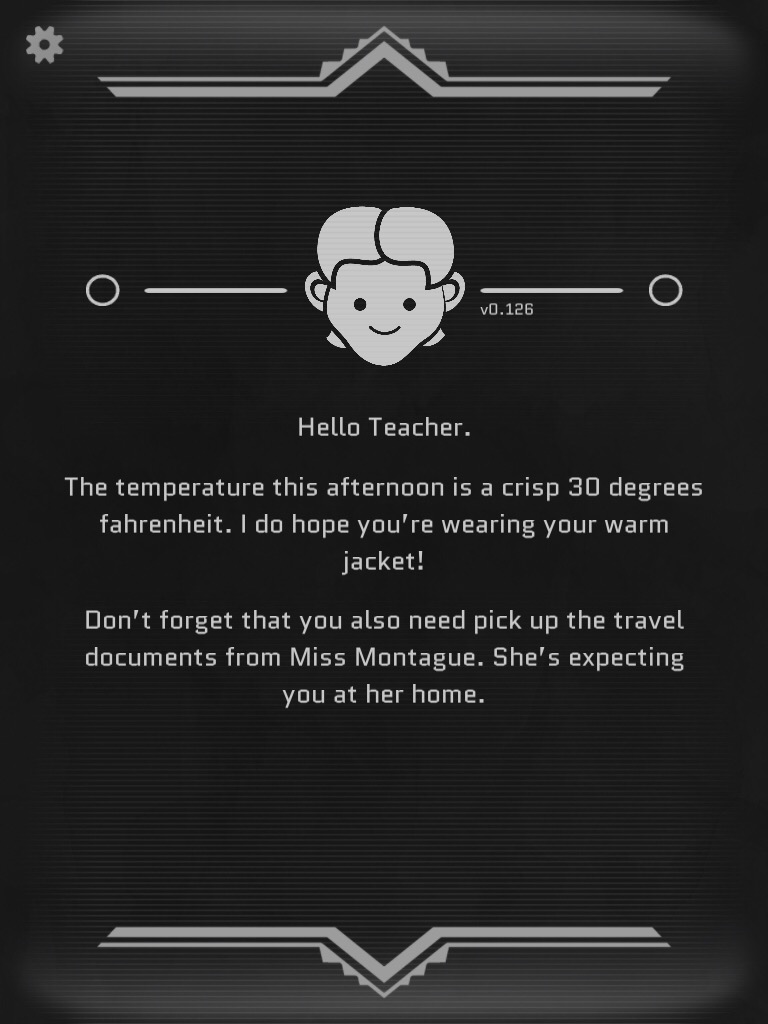 From when you started in the App Store to how it is now, we’ve seen a really big sea change, especially with how paid apps are viewed compared to free apps. How do you feel about the future of the iOS or mobile market in general for the kind of work that you do?
From when you started in the App Store to how it is now, we’ve seen a really big sea change, especially with how paid apps are viewed compared to free apps. How do you feel about the future of the iOS or mobile market in general for the kind of work that you do?
That’s a really hard one!
Well, they can’t all be pizza toppings!
Every time I think I’ve got a grasp of how the App Store works, I’m completely amazed at how wrong I am. Games pop along that just turn everything on its head again. Sometimes it’s just one game and how it’s monetized. Everything is in such flux all the time that it’s really hard to get a gauge on how things will be or where they are going. I mean, it’s clear to see that the big money is on free-to-play, but still, even with that said, only a few companies make the really big dollars there. There are a lot of free-to-play games that make no money.
Yeah, absolutely.
A lot of the big companies that make free-to-play titles, they’re driven by ad revenue and spending on marketing. You know, Clash of Clans appears everywhere. It’s on the TV, it’s on absolutely everything. Obviously, for developers like Tin Man Games, we can’t compete with that. There’s no point. We have to kind of rely on other things. We released our free-to-play game Choices, and we went the subscription route. We have to rely on our relationship with Apple. We get in touch with them, talk to them, and hope they will help us out by featuring. We do Facebook ads, throwing $50 here and there at things to try and get recognized… it’s hard. Yeah. It’s hard. Sorry, what was the original question? (laughs)
Oh. (laughs) Uh, are you optimistic about your future projects on mobile, given the way the market’s changed?
Yeah, I think I am. I think we’ve always had a bit of a mantra of staying as premium as possible. A lot of our gamebook apps were always floating around five or six dollars. We tried many times to crash everything down to one dollar, you know, follow the trend, but we never did. I think that works in our favor, because we’ve got a really niche audience, and our audience were always happy to pay a bit more because they knew what we were doing was tailored to them. So we stuck to our guns on that and I think it really worked.
And the digital versions that you do are cheaper than the paper versions, so it’s actually a discount.
It is, and there are lots of other things in there like the cheats, the music, and colorized artwork. And also, the logic is changed because we have to manage the stats and all of that.
It kind of reminds me of… well, this is a strange genre to compare it to, but it kind of reminds me of pinball. You know, where you’ve got a built-in audience for it that comes from outside of the business that is going to seek these things out because they’re actually a genuinely good value and a good experience even compared to the source.
Hm. Maybe we need to make a pinball gamebook. Get those audiences lined up beautifully.
Hey! I would buy that. But standard proviso, Neil. If you make games that I would like to buy, you’re probably not going to make money. (laughs)
“To flip left, turn to 465. To flip right, turn to…"
Oh, man! I’m getting excited! Neil, you’ve got to stop! I’m getting the vapors here!
“To hit the table, turn to page 362."
Oh, but you have to choose how hard you hit the table, and if you hit it too hard, you get a game over!
Well, you’d have to roll the dice for that, surely.
Oh, I like this. I like this.
Amazing. Maybe this is the wave of the future.
There you go! Pinball gamebooks, you heard it here first!
Yes, we’ll sell them for $25. (laughing)
On Present and Future Projects from Tin Man Games
Well, I guess we should wind towards the end here, we’re getting up there on the timer. What I want to ask you now is that if you could only recommend one Tin Man gamebook for our readers to buy and enjoy, which one would you most recommend?
Um, okay. Well, I think if you are only going to buy one, if you don’t really know what gamebooks are and you’re only buying one because you’re listening to Neil and he sounds like a nice guy, I would buy our very first one. An Assassin in Orlandes. Because that book evokes such nostalgia for me. We released that game just around the time that my daughter was being born, and I just have to hear the music of that game and it brings me right back. I was stepping into an uncharted world, we didn’t have any money, it was all a big gamble and a bit crazy, and I think that game speaks a lot of what we were trying to do, the kind of emotions we were trying to evoke. And it’s not the best one in the collection I don’t think, but the whole package, the music, it just works. It’s beautiful.
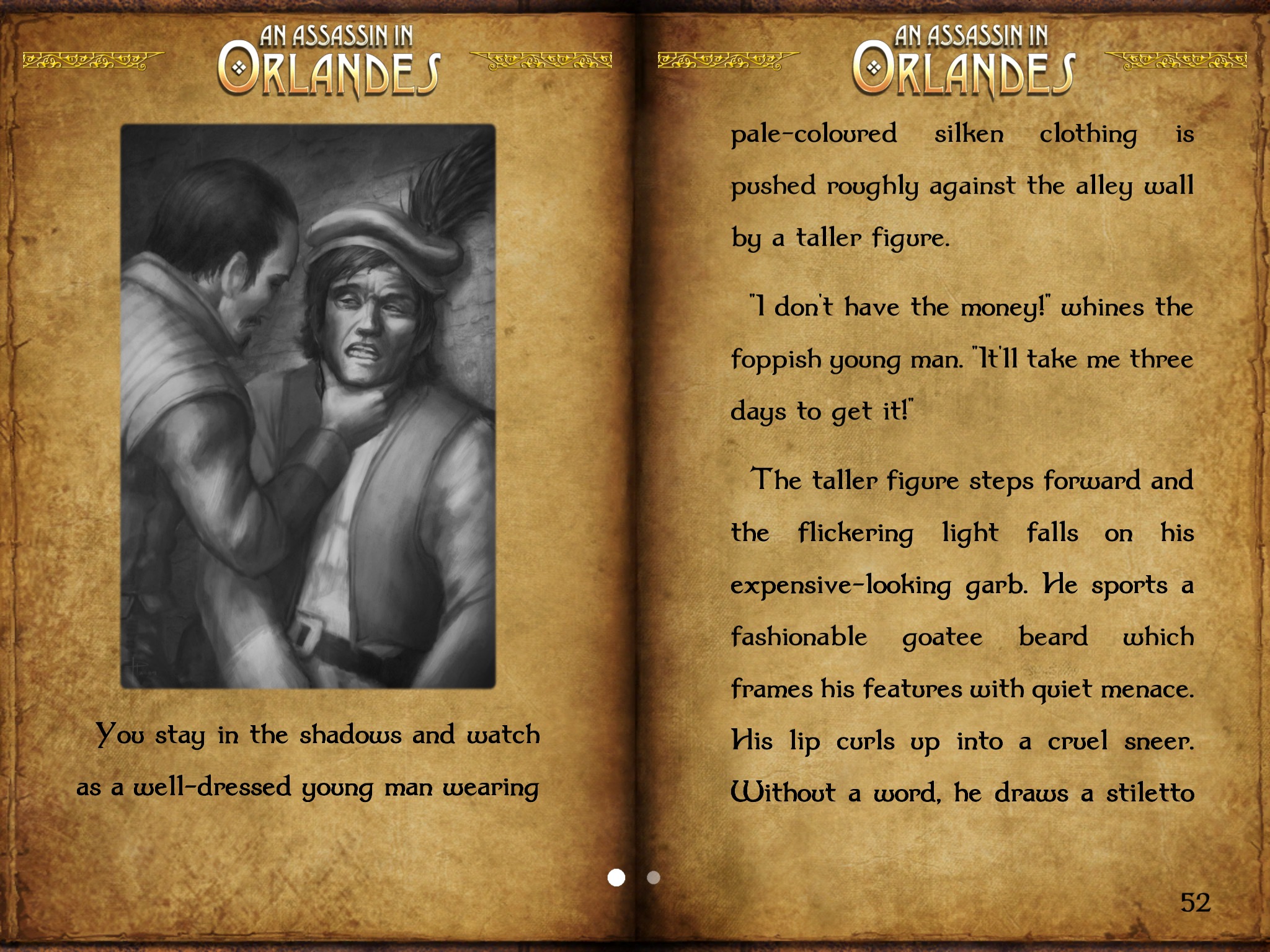
Well, there you go. That would be Gamebook Adventures 1: An Assassin in Orlandes ($5.99). That’s the one, check it out everyone. I’m going to give you the chance to plug whatever you want now, Neil. The floor is yours, you can shamelessly market whatever you want.
Excellent! So, we have three products at the minute that I want to give some attention. The first is Choices: And the Sun Went Out, and you can download that on the App Store. It’s subscription-based, and you only have to pay $3 for a six-month subscription. For that, you get a weekly update to the story. There are two stories in there at the minute, and one of the stories will be ending in December. After that, we’ll be introducing a third.
You know, I played Choices a bit. If you like the drama of a weekly or monthly comic book series where you get part of the story and then have to wait with anticipation for the next part, Choices is very cool at evoking that feeling.
Good to hear, that was the aim. I’m also going to plug two products that we haven’t launched yet. The first one will be out early next year, which is the Miss Fisher Murder Mysteries game that we’re doing. It’s a whole new take for us, we’re actually creating a visual novel. It’s like a gamebook/visual novel murder mystery game. It’s based on the TV show that’s really popular here in Australia, and some places elsewhere in the world because it’s on Netflix. I recommend you check that out because it’s really exciting.
From what I’ve seen, it looks really cool. Of course, I love visual novels just as I love gamebooks, so I will give my thumbs-up on that one, at least on the concept. I’ll have to give my final verdict on that one once it’s finished, though.
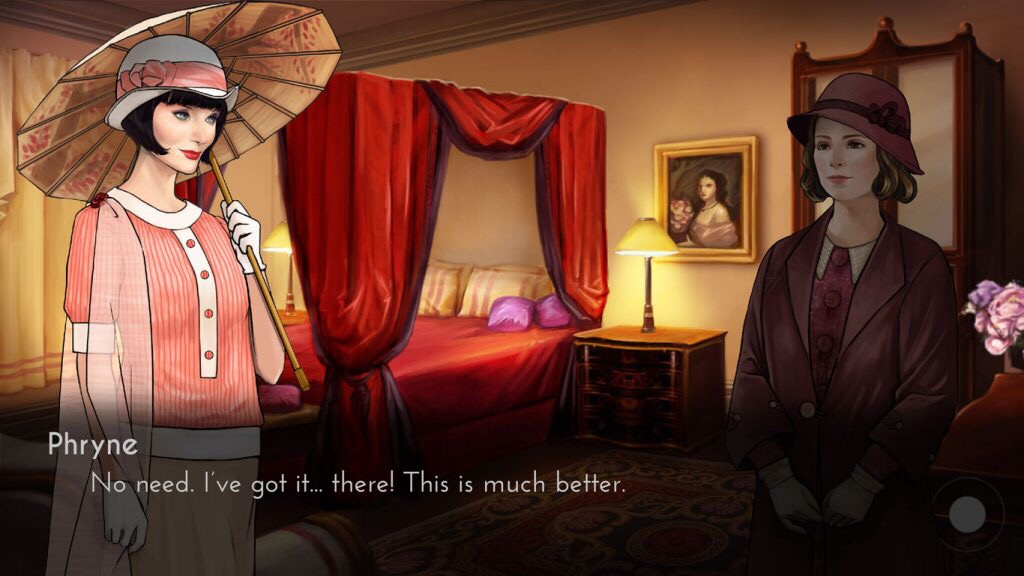
The third thing is The Warlock of Firetop Mountain, which is currently available on Steam, but it will be coming to iOS and hopefully other mobile platforms around the end of February 2017. I’m pretty proud of what we achieved with that. Very small team, very big ambitions, and I think we delivered. I think it’s the best adaptation of a gamebook on a computer system, personally. I recommend checking that out.
Warlock just looks amazing, amazing, amazing. I can’t wait to get my hands on that. So I think that’s kind of it, so if you had anything else you wanted to say, Neil, this is your chance. Otherwise, I’m just going to say thank you very much for your time.
No worries. I think I’ve done everything. I’ve said everything.
Yeah, we had a good chat! Well, thanks a lot, Neil. I really appreciate it, and I know our readers appreciate it, too. It’s always nice to hear from the people behind the games, and get a little view behind the curtain.
Oh, I will say one thing, actually. If there is anybody reading this that bought any of our apps in the past and supported us, I just want to say thank you. Because we are a funny little niche medium, and we value every single purchase. It’s just really important, it keeps us going. It’s important for small indies, to support them that way.
Well, I’m sure that niche is happy that they’re being served too, so I think it’s win-win all around. Thanks a lot, Neil!
No worries.
I’m sure we’ll talk to you again when Warlock comes out, but for now, we shall let you get back to your work, sir.
Cheers, thank you.
Thanks again to Neil for agreeing to this interview and sharing so much with us. Thanks also to you, the readers, for supporting this idea. This one was a little longer than you can probably expect to see in the future, but hey, I have faith that regular RPG Reload readers can handle it. If you have any developers you’re interested in hearing from, or if you are a developer interested in taking part in one of these interviews, please let me know in the comments below or by tweeting me at @RPGReload. As for me, I’ll be back next with a Classic Reload. Thanks for reading!
Next Week’s Reload: Superbrothers: Sword and Sworcery EP ($3.99)